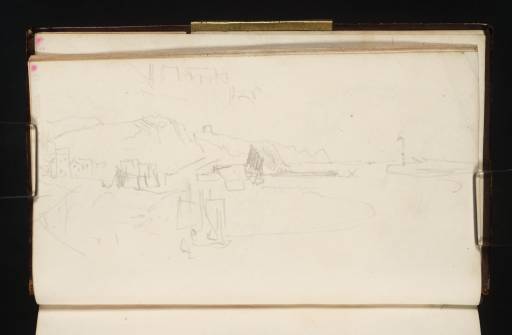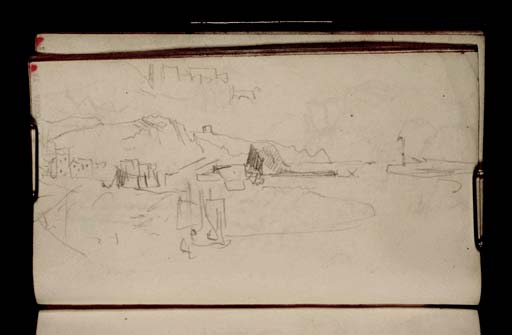Joseph Mallord William Turner Folkestone Harbour, with the Coast towards Dover in the Distance 1825
Image 1 of 2
Joseph Mallord William Turner,
Folkestone Harbour, with the Coast towards Dover in the Distance
1825
Joseph Mallord William Turner 1775–1851
Folio 12 Verso:
Folkestone Harbour, with the Coast towards Dover in the Distance 1825
D18864
Turner Bequest CCXIV 12a
Turner Bequest CCXIV 12a
Pencil on white wove paper, 95 x 155 mm
Accepted by the nation as part of the Turner Bequest 1856
References
1909
A.J. Finberg, A Complete Inventory of the Drawings of the Turner Bequest, London 1909, vol.II, p.651, CCXIV 12a, as ‘Do. do.’ (i.e. ditto: ‘Scene on coast. (? at Folkestone.)’).
With the page turned horizontally, the setting is Folkestone, as tentatively suggested by Finberg,1 with three bands of related sketches; the main view is east-north-east from the harbour, which was later considerably expanded and redeveloped. On the left are houses along the Stade, which do not survive, and Martello Tower No.3 on the skyline above the dark sail and hatched sandstone cliffs towards Copt Point.2 Beyond, the undulating and somewhat compressed line of white chalk cliffs along East Wear Bay stretch away to the distinctive if exaggerated profile of Shakespeare Cliff, about five miles off on the near side of Dover (see under folio 2 recto; D18843). Above and below are partial reprises, with houses and other sails (see also folio 13 recto opposite; D18865).
The view is comparable to that in the background of the watercolour Folkestone Harbour and Coast to Dover (Yale Center for British Art, New Haven),3 engraved in 1831 for the Picturesque Views in England and Wales (Tate impressions: T04570–T04571), where the foreground became a broad sandy beach as the setting for a smuggling-related subject. In his detailed study of the England and Wales series, Eric Shanes did not mention this sketchbook in relation to the watercolour, but noted drawings in the Richmond Hill; Hastings to Margate book of about 1816–19 (Tate D10477; Turner Bequest CXL 35a) and the Folkestone book of about 1821–2 (D17258–D17259, D17261; CXCVIII 30a, 31, 32).4
While the earlier drawings show similar prospects and demonstrate that the scene had already made an impression on Turner, they are all slighter, and it seems that in practice he based the composition on the present sketch and the variants on folios 13 verso, 14 verso and 17 recto (D18866, D18868, D18873). Likely prompted by the shading here and on D18866 and D18868, not featured in the previous views, in the watercolour he was careful to differentiate between the darker cliffs above the harbour and the bright chalk beyond. For Turner’s numerous other Folkestone views in this book (including sketches relating to other watercolours) and elsewhere, see under folio 8 recto (D18855).
Matthew Imms
September 2020
See Peter Faulkner ed., ‘Martello Towers in Kent’, Martello Towers, accessed 27 February 2020, https://martellotowers.co.uk/kent .
How to cite
Matthew Imms, ‘Folkestone Harbour, with the Coast towards Dover in the Distance 1825 by Joseph Mallord William Turner’, catalogue entry, September 2020, in David Blayney Brown (ed.), J.M.W. Turner: Sketchbooks, Drawings and Watercolours, Tate Research Publication, March 2023, https://www


